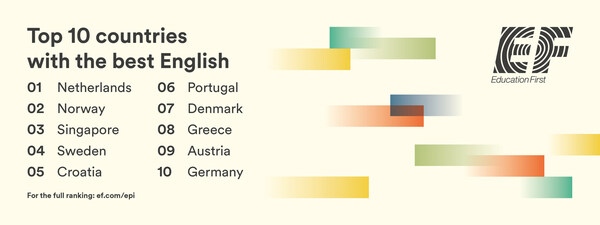 |

The EF English Proficiency Index is an annual ranking of countries, capital cities and regions by English skills.
Overall, the 2024 index, calculated from the test results of 2.1 million non-native English speakers, aged 18+, in 116 countries and regions, reports an ongoing softening of worldwide English proficiency where men remain more proficient than women, and young professionals more proficient than students and adults over 40.
"The global landscape of English proficiency is constantly evolving," said EF EPI author Kate Bell. "While the Middle East and Africa have improved this year, on the whole, we see a slow but persistent decline in the level of English among adults elsewhere. This trend supports the impression that in 2024, the expectation in many countries is that everyone speaks English, regardless of the reality, leading to a loss of focus on improving English proficiency in both the education system and the private sector."
Key findings:
- Declining global proficiency: 60 percent of countries are scoring somewhat lower this year than last. On the positive side, the long downward youth proficiency trend in the 18 - 20 cohort halted this year.
- Persistent gender gap: Since last year, women's English proficiency remained stable while men's declined, which has narrowed the gender gap. However, in 40 countries, men's English proficiency is still significantly higher than women's. Africa remains the exception, as the only continent where women have consistently better English skills than men, and women's proficiency improved the most. Worldwide, the gender gap is widest among the youngest cohort and narrows progressively over time.
- Regional developments: Asia's English proficiency declined more than any other region compared to last year, mainly driven by India and, to a lesser extent, China. English proficiency in Europe also declined slightly, with a larger decline within the EU versus outside of it. After years of rising proficiency, Latin America's regional average remained stable, with regional differences. In the Middle East, English proficiency continues to improve slowly, particularly in Saudia Arabia.
EF Education First provides culturally immersive education through language, travel, cultural exchange, and academic programs in over 100 countries. Founded in Sweden in 1965, EF's mission is opening the world through education.
Media contact: Sonja Hildebrandt. Email: [email protected]

